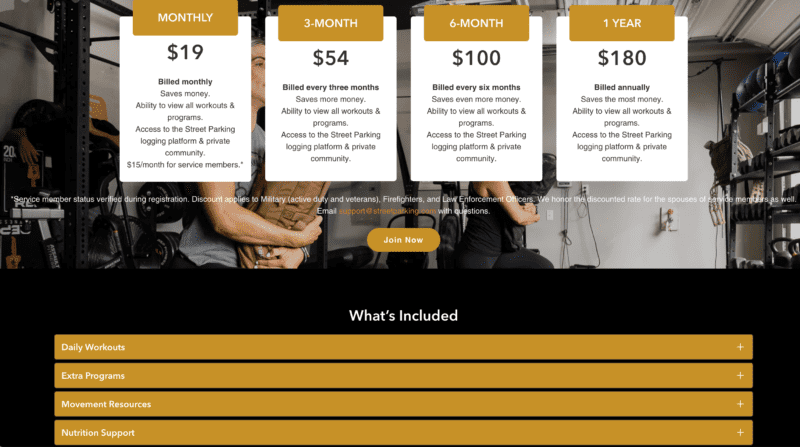Last updated on 5th October 2023 at 14:11 by Alex Nicholas
When it comes to selling online and online shopping, people will automatically think of traditional eCommerce stores and retail when they think of Shopify, and to be fair, you’d be correct because that’s who it’s primarily aimed at. Business owners that sell physical products with inventory and order fulfilment.
However, what’s not as common as it possibly should be is selling services on Shopify, and that’s a mistake, in my opinion as a Shopify SEO consultant.
In fact, in many instances, the whole Shopify process is ideal for small business owners that sell services to the general public at fixed or multi-buy prices and don’t want the hassle of setting up payment processors or handling hosting because Shopify handles all of this out of the box.
Here’s a list of services business ideas, all of which are services that wouldn’t traditionally use Shopify to sell their services that would benefit:
- Education business or courses
- Consultants
- Rental companies
- Workshops
- Training days
- Music, arts or dance classes
- Appointment based businesses
- Copywriting services
- Dog training services
- Personal trainers
At it’s core, the entire Shopify process is an e-commerce platform that's designed to sell products, which can and should include services as well.
If for example your business is focused on consulting or educational courses then the process is very straightforward and you can be up and running within a day.
And the best part of this is that you don't need a designer due to Shopify's drag-and-drop capabilities. All you need is a little creativity and you can design an industry focused website that speaks directly to your target market.
This is especially good for companies that need more than one Shopify store because they're operating in separate niches.
Listing services on Shopify
Now to the fun part, setting up variations so that customers can add your service to cart, checkout through Shopify and start driving revenue and orders.
When creating your service as a buyable product, you’ll need to use Shopify’s existing product management tool, exactly like a physical product retailer would.
So start by heading over to the products > add product, to start learning how Shopify's product ecosystem system works.

Then start filling in your service information, including all relevant information.
You can also set your page to active if you're ready to go live or draft if you're not.
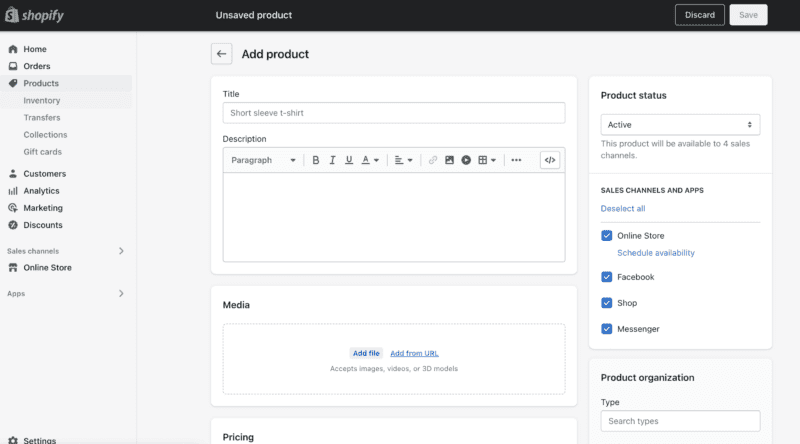
Here's where you include any variants you might have, be that group buys, discounts, locations, time limits etc.
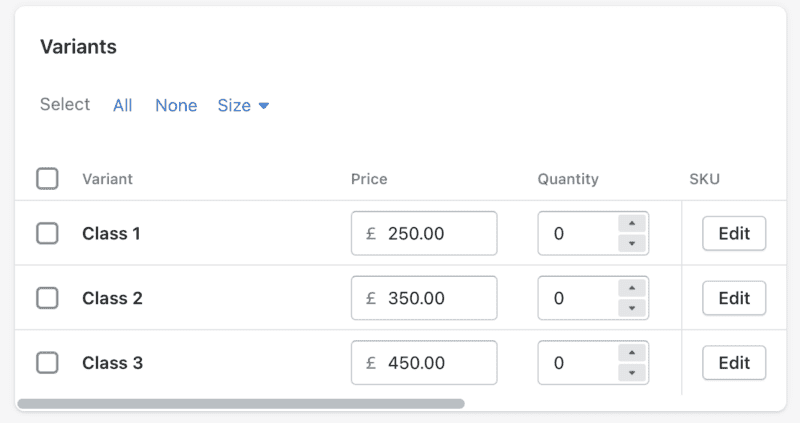
But make sure that you uncheck the “This is a physical product” box – which in itself shows that Shopify is expecting users that don’t sell physical products.
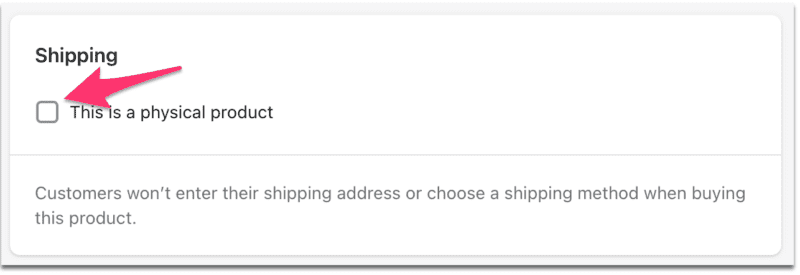
One thing I will add is that you must make sure that your product pages aren’t confusing, so be sure to separate group buys from single purchases if it makes sense to do so. This will make marketing your services easier and purchasing decisions for the customer straightforward.
Booking time slots through Shopify?
There are countless service providers that need you to book a time slot before you make any purchase such as personal trainers or spas, and thankfully there are many good booking appointment apps such as Book That App that will effortlessly allow you to let customers choose times, as well as letting you manage your schedule and never get double booked.
To give you an idea of what this looks like in action let’s take a look at the tailored clothing brand Toufie and how they’ve utilised their booking system.
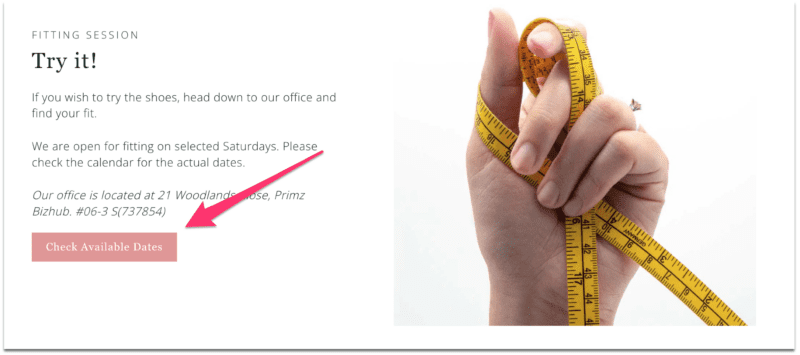
As you can see, when you “check available dates” you're taken to their fitting session date and time selection page that allows you to confirm your slot.
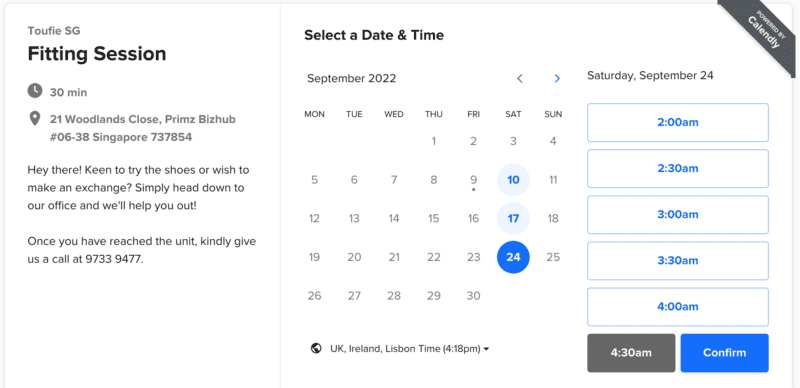
When you've confirmed your date and time the app will then update to make sure you don't get double booked and lose your space.
Compelling descriptions
Product descriptions are a big part of SEO for your Shopify store so you'll need to sell and convey the right message whilst making sure that search engines have enough relevant information to rank you.
When selling services on Shopify, your description needs to be perfect because it’s the main content the shopper will see when they land on the product page. This is a little different to stores that sell physical products because in the main, physical products need to focus on slightly different things.
So don’t be afraid to write detailed guides that show testimonials, videos and comprehensive user guides.
Images for your service
As with any product or service, your product imagery must be enticing, clear and original. You need to showcase your service in action and have plenty of them.
This might be a little harder to accomplish with digital products, but the number one takeaway is to make sure that you make it clear to your customers exactly what they will be getting when they buy.
Email automation
One thing I would do, however, is to set up an automated email confirmation that details how, what, and why questions your customers might have. For example, if part of your process is that you’ll be in touch within 2 days to discuss the next steps, then make sure all of the finer details are covered so they know what to expect.
This can be done in the form of a Google form attachment or more preferably via a link directly back to a page on your site that lists everything they need to know.
These details MUST be in the product description as well, but you’ll reassure the customer if they receive them in an automated email directly after they purchase.
Examples of service companies using Shopify
To give you a better idea of what can be achieved by using a Shopify store to sell non-physical products, let’s take a quick look at two sites that have utilised Shopify to their advantage and that you can study yourself.
First up let’s look at streetparking.com
Street Parking is a monthly subscription business that provides daily workouts 6 days a week for a monthly, 3-month, 6-month or yearly fee.
It’s a simple model with a large profit margin because it only requires the business owners to upload workouts. There are minimal overheads with the main expense being the owner's time and the cost of a Shopify plan.
Now let’s look at Aspen Expeditions, which is an ‘experience' website that sells holidays to Aspen (obviously).
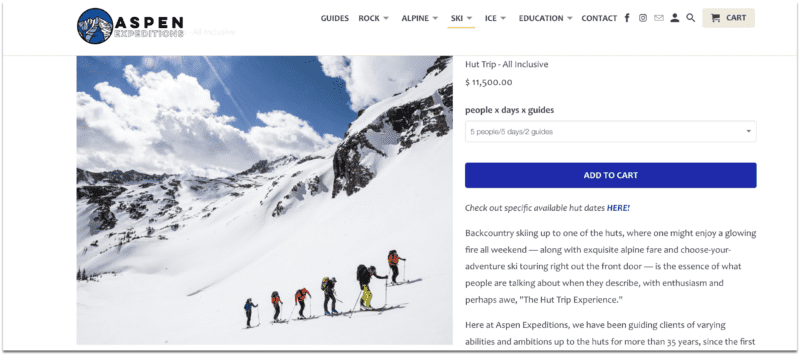
Here you can see that they have a Shopify product page set up to sell skiing trips with the variations being people/days/guides. Each of which you can adjust via the drop-down.

The beautiful thing about all of this is the flexibility that Shopify gives you because there are countless variations that you can use that will suit your customers, all without needing to pay a developer to customise or update anything.
It allows you to give each customer a level of personalization that will suit them, and enhance your brand appeal and your company revenue.
Conclusion
If you're planning on setting up a service business or have a service business as a model and need the option for customers to buy via a website, then using Shopify is a smart move due to it's flexibility and ease of use.
You get to focus your efforts on your customer's potential needs and what you offer rather than worrying about how they're going to pay, setting up hosting or paying overpriced developers.
And that's not to mention the endless apps that can solve nearly every problem you might encounter.
